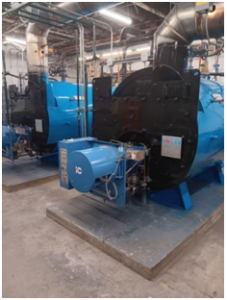A steam generator or a boiler is defined as a closed vessel in which water is converted into steam by burning fuel in the presence of air at the desired temperature, pressure, and desired mass flow rate. The combination of heat and water produces steam. Steam boilers are defined by their construction, portability, types of tubes, types of fuel, and the pressure they produce.
Industrial boilers play a crucial role in various manufacturing processes, providing the necessary heat and steam for operations. To ensure the optimal performance, longevity, and safety of these boilers, regular chemical treatment for boilers is important. Chemical treatment involves the use of specific compounds to mitigate issues such as corrosion and scale formation within the boiler system. This proactive approach not only enhances the efficiency of the boiler but also contributes to considerable cost savings and environmental sustainability.
The basic principle involves heating water to create steam, and the steam is then circulated through pipes to radiators or other heat exchangers, where it releases its thermal energy to heat spaces or provide process heat.
The function of a boiler
The steam generated is employed for the following purposes.
- Used in steam turbines to develop electrical energy.
- Used to run steam engines.
- In the textile industries, sugar mills, or in chemical industries as a cogeneration plant.
- Heating the buildings in cold weather
- Producing hot water for the hot water supply
Visit: www.blissflowsystems.com


